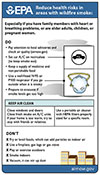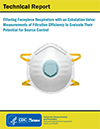Fire Mask/Respirator Palm Cards
- Infographic: Reduce Health Risks In Areas With Wildfire Smoke
- An Evaluation of DIY Air Filtration
- Filtering Facepiece Respirators with an Exhalation Valve
- Effect of Fit Testing on the Protection Offered by N95 Filtering Facepiece Respirators Against Fine Particles in a Laboratory Setting
- Chinese Simplified Palm Card
- Chinese Traditional Palm Card
- Palm Card English
- Palm Card - Korean
- Palm Card Spanish
- Palm Card Tagalog
- Palm Card Vietnamese

|
Infographic: Reduce Health Risks In Areas With Wildfire SmokeReduce health risks in areas with wildfire smoke. Especially if you have family members with heart or breathing problems, or are older adults, children, or pregnant women. June 2018 |

|
An Evaluation of DIY Air FiltrationHousehold use of portable air cleaners has increased in the face of recent wildland fire activity and in response to COVID-19. Some local agencies have begun recommending Do-It-Yourself (DIY) air cleaners (i.e., furnace air filter attached to electric box fans) during smoke events as DIYs offer an affordable and accessible alternative to commercially available air cleaners, which frequently sell out during smoke events. However, there are concerns regarding the safety of DIY air cleaners as these consumer fans are not being used as intended by the manufacturers and have not been evaluated by safety certification processes. |

|
Filtering Facepiece Respirators with an Exhalation ValveMasks and respiratory protective devices may protect the wearer to varying degrees from exposure to potentially infectious droplets, and these devices have varying degrees of protection. These devices can be classified into three categories: (1) respirators (e.g., those that are NIOSH-approved respirators or authorized for emergency use); (2) masks intended for medical purposes (e.g., FDA-cleared surgical masks including those labeled as procedure masks); and (3)masks intended for a non-medical purpose. |

|
Effect of Fit Testing on the Protection Offered by N95 Filtering Facepiece Respirators Against Fine Particles in a Laboratory SettingThere is increased interest in the performance of respirators against fine particles such as nanoparticles (natural and engineered) and bioaerosol articles (e.g. viruses and bacteria). Although the effect of particle size on the performance of respirators has been studied in the laboratory using manikins, only a few studies have been conducted with human subjects. |

|
Chinese Simplified Palm CardChinese Simplified Palm Card - Front and Back |

|
Chinese Traditional Palm CardChinese Traditional Palm Card - Front and Back |

|
Palm Card EnglishPalm Card English - Front and Back |

|
Palm Card - KoreanPalm Card Korean - Front and Back |

|
Palm Card SpanishPalm Card Spanish - Front and Back |

|
Palm Card TagalogPalm Card Tagalog - Front and Back |

|
Palm Card VietnamesePalm Card Vietnamese - Front and Back |






